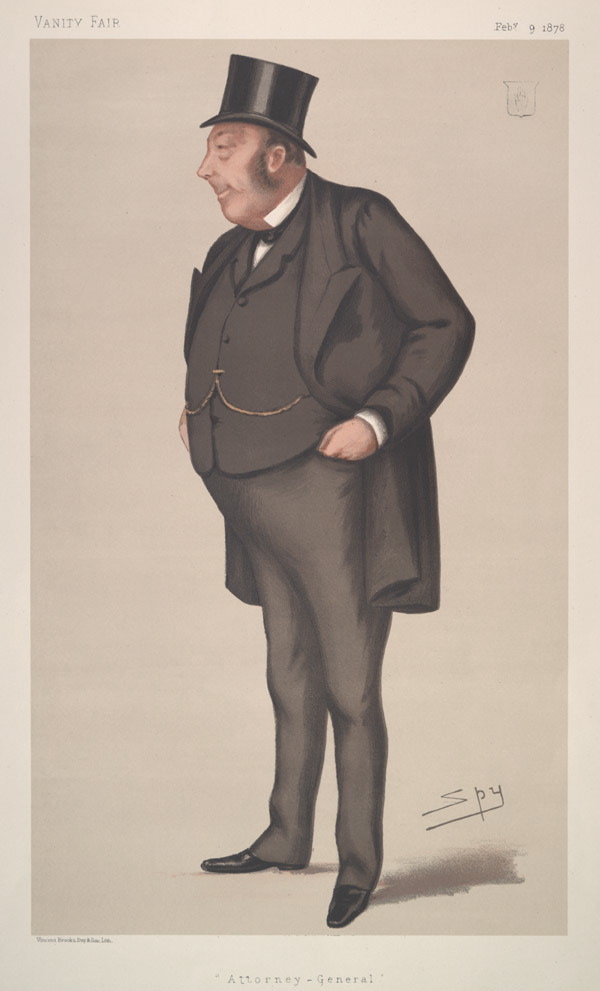Lord Justice Holker on:
[Wikipedia]
[Google]
[Amazon]

 Sir John Holker (1828 – 24 May 1882) was a British lawyer, politician, and judge. He sat as a
Sir John Holker (1828 – 24 May 1882) was a British lawyer, politician, and judge. He sat as a
accessed 29 Aug 2013

 Sir John Holker (1828 – 24 May 1882) was a British lawyer, politician, and judge. He sat as a
Sir John Holker (1828 – 24 May 1882) was a British lawyer, politician, and judge. He sat as a Member of Parliament
A member of parliament (MP) is the representative in parliament of the people who live in their electoral district. In many countries with bicameral parliaments, this term refers only to members of the lower house since upper house members of ...
for Preston from 1872 until his death ten years later. He was first Solicitor General and later Attorney General in the second government of Benjamin Disraeli
Benjamin Disraeli, 1st Earl of Beaconsfield, (21 December 1804 – 19 April 1881) was a British statesman and Conservative politician who twice served as Prime Minister of the United Kingdom. He played a central role in the creation o ...
.
Biography
Holker was born inBury, Lancashire
Bury ( ) is a market town on the River Irwell in Greater Manchester, England. Metropolitan Borough of Bury is administered from the town, which had an estimated population of 78,723 in 2015.
The town is within the Historic counties of Englan ...
, and educated at Bury Grammar School
(The key that opens sacred doors)
, established =
, type = Independent day schoolGrammar school
, religion = Church of England
, head_label = Headmaster
, head ...
. After being articled to a solicitor, he was called to the bar at Gray's Inn
The Honourable Society of Gray's Inn, commonly known as Gray's Inn, is one of the four Inns of Court (professional associations for barristers and judges) in London. To be called to the bar in order to practise as a barrister in England and Wale ...
in 1854, where he was later a bencher
A bencher or Master of the Bench is a senior member of an Inn of Court in England and Wales or the Inns of Court in Northern Ireland, or the Honorable Society of King's Inns in Ireland. Benchers hold office for life once elected. A bencher can ...
, and treasurer in 1875. He joined the Northern Circuit
{{Use dmy dates, date=November 2019
The Northern Circuit is a court circuit in England. It dates from 1176 when Henry II sent his judges on circuit to do justice in his name. The Circuit encompassed the whole of the North of England but in 1876 i ...
, and lived in Manchester. He married in 1861 but had no children. After his first wife died, he remarried in 1874 to Miss Mary Lucia Richardson. There were no children from either marriage.
He returned to London in 1864, where he developed a very successful and lucrative legal practice, and was appointed Queen's Counsel
In the United Kingdom and in some Commonwealth of Nations, Commonwealth countries, a King's Counsel (Post-nominal letters, post-nominal initials KC) during the reign of a king, or Queen's Counsel (post-nominal initials QC) during the reign of ...
in 1866.
He was the Conservative candidate at a by-election in Preston in 1872, one of the first held after the Ballot Act 1872
The Ballot Act 1872 was an Act of the Parliament of the United Kingdom that introduced the requirement for parliamentary and local government elections in the United Kingdom to be held by secret ballot. The act abolished the traditional hustings ...
required the use of a secret ballot
The secret ballot, also known as the Australian ballot, is a voting method in which a voter's identity in an election or a referendum is anonymous. This forestalls attempts to influence the voter by intimidation, blackmailing, and potential vote ...
. He served as Member of Parliament
A member of parliament (MP) is the representative in parliament of the people who live in their electoral district. In many countries with bicameral parliaments, this term refers only to members of the lower house since upper house members of ...
for Preston until his death in 1882. He became Solicitor General in the government of Benjamin Disraeli
Benjamin Disraeli, 1st Earl of Beaconsfield, (21 December 1804 – 19 April 1881) was a British statesman and Conservative politician who twice served as Prime Minister of the United Kingdom. He played a central role in the creation o ...
in 1874, and was knighted. He replaced Sir Richard Baggallay
Sir Richard Baggallay Privy Council of the United Kingdom, PC (1816 – 1888) was a British barrister, politician, and judge. After serving as Attorney General for England and Wales, Attorney-General under Benjamin Disraeli from 1874 to 1875, ...
as Attorney General in 1875, retaining in the position until Liberals won the general election in 1880.
He was appointed a Lord Justice of Appeal
A Lord Justice of Appeal or Lady Justice of Appeal is a judge of the Court of Appeal of England and Wales, the court that hears appeals from the High Court of Justice, the Crown Court and other courts and tribunals. A Lord (or Lady) Justice ...
in January 1882, but resigned due to ill health in May, and died in London a few days later.
References
* * J. A. Hamilton, ‘Holker, Sir John (1828–1882)’, rev. Hugh Mooney, Oxford Dictionary of National Biography, Oxford University Press, 200accessed 29 Aug 2013
External links
* 1828 births 1882 deaths Conservative Party (UK) MPs for English constituencies People educated at Bury Grammar School UK MPs 1868–1874 UK MPs 1874–1880 UK MPs 1880–1885 Attorneys General for England and Wales Solicitors General for England and Wales Members of Gray's Inn People from Bury, Greater Manchester Members of the Privy Council of the United Kingdom {{England-Conservative-UK-MP-1820s-stub